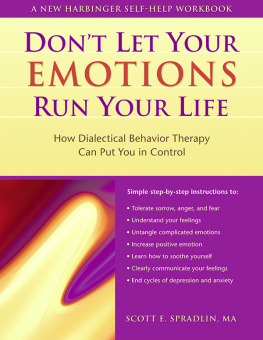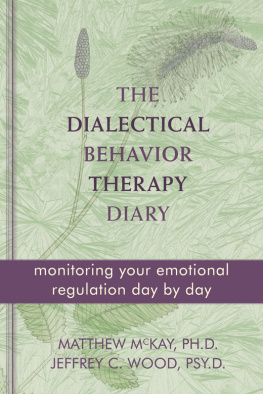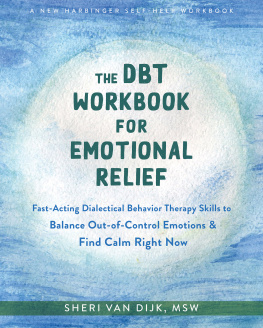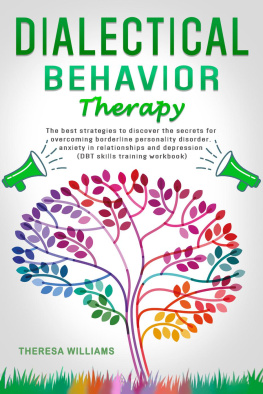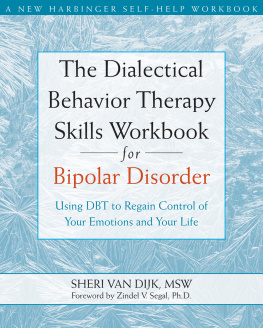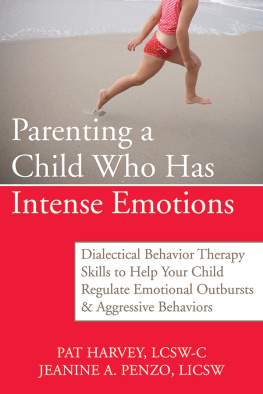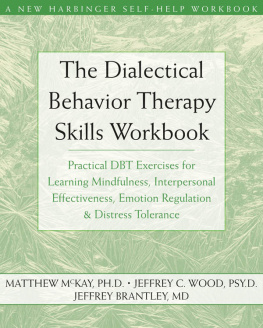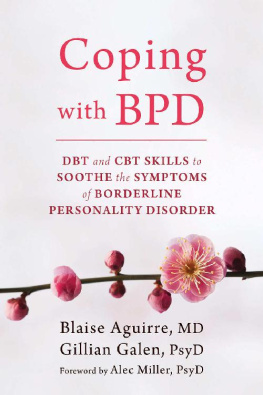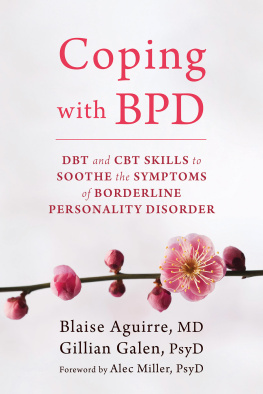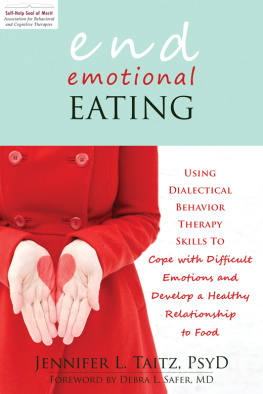Cedar Koons has written a thorough, practical workbook for people with intense emotions. Often mindfulness skills seem mysterious, and explaining them to another person is like trying to help someone understand what chocolate tastes like when they have never tasted it before. Koons bridges the gap between Eastern/Buddhist practice and a way to know and regulate intense emotions by providing the reader with concrete examples, case stories, and practices. I will recommend this book to all of my emotionally intense clients.
Shari Manning, PhD, founding partner of the Treatment Implementation Collaborative, LLC, a group that provides dialectical behavior therapy (DBT) training, consultation, and supervision worldwide; and practicing DBT therapist of over twenty years who was trained by Marsha Linehan, PhD
A seasoned expert in both dialectical behavior therapy (DBT) and mindfulness, Cedar Koons has packed a ton of wisdom into this book. She brings the material alive with vivid writing and her use of illustrative case examples and practical mindfulness exercises. Even more impressively, she unpacks concepts such as wise mind in a way that is both true to DBT, and practical for readers who are first learning about DBT mindfulness skills. I would highly recommend this book for anyone struggling with intense, hard-to-tolerate emotions. Clinicians helping people with intense emotions will also benefit greatly from Cedars practical guidance on how to understand and use mindfulness skills.
Alexander L. Chapman, PhD, RPsych, professor of psychology at Simon Fraser University, president of the DBT Centre of Vancouver, and coauthor of The Dialectical Behavior Therapy Skills Workbook for Anger, The Borderline Personality Disorder Survival Guide, and The Dialectical Behavior Therapy Skills Workbook for Anxiety
Reading Cedars wonderful book was an exercise in beginners mind. It is a reminder that there are infinite ways to practice mindfulness, and so the book will resonate with the person new to mindfulness as well as with the expert who is open to the richness of new teachings. By practicing the skills in this book, the result for the person struggling with intense emotions will be greater mastery and control of their experience; and the expert, too, if open to new learning, will continue to strengthen and broaden the delivery of skilled and compassionate care.
Blaise Aguirre, MD, medical director at McLean 3East Continuum of Care, assistant professor of psychiatry at Harvard Medical School, author of Borderline Personality Disorder in Adolescents, and coauthor of Mindfulness for Borderline Personality Disorder and Coping with BPD
I highly recommend The Mindfulness Solution for Intense Emotions to anyoneKoonss teaching, examples, and stories are so clear, engaging, and inspiring. If you are wondering which self-help book to buy, this is the one. It gets right to the heart of the matter!
Mitch Ditkoff, cofounder and president of Idea Champions, and author of Storytelling at Work
Two things are certain: the path through suffering involves an active practice of mindfulness, and the way is much smoother and direct when guided by a skilled, compassionate, and astute teacher. Cedar Koons, a gifted writer, inspiring mindfulness practitioner, and dialectical behavior therapy (DBT) master, is just that person, and her book, The Mindfulness Solution for Intense Emotions, is just the road map many of us need to begin or strengthen our own mindfulness practice. Cedars deep wisdom about mindfulness and DBT resonates throughout each pagethrough story, vignette, explanation, and practical exercises. Her style is personal, accessible, and direct. For those of us who seek solace from suffering, to live freely with our eyes and hearts wide open, this book is for you!
Linda A. Dimeff, PhD, president and chief scientific officer at Evidence-Based Practice Institute in Seattle, WA; institute director at Portland DBT Institute in Portland, OR; and coeditor of Dialectical Behavior Therapy in Clinical Practice

Publishers Note
This publication is designed to provide accurate and authoritative information in regard to the subject matter covered. It is sold with the understanding that the publisher is not engaged in rendering psychological, financial, legal, or other professional services. If expert assistance or counseling is needed, the services of a competent professional should be sought.
Distributed in Canada by Raincoast Books
Copyright 2016 by Cedar Koons
New Harbinger Publications, Inc.
5674 Shattuck Avenue
Oakland, CA 94609
www.newharbinger.com
Cover design by Amy Shoup
Acquired by Catharine Meyers
Edited by Susan LaCroix
All Rights Reserved
Library of Congress Cataloging-in-Publication Data on file
For Prem Rawat
and for Eddie
Contents
Marsha M. Linehan
Practically everyone has struggled with strong emotions at some time during their lives. Emotional turmoil often accompanies life events like divorce, serious illness, or long-term unemployment. For some people, however, emotional suffering can feel constant and overwhelming, because their emotions are particularly intense and difficult to manage. Attempts to escape such emotional pain can lead to failed relationships, addictions, even suicide.
Learning to tolerate emotional pain until it passes is very difficult and requires tremendous courage and will. But courage and will alone cannot take one from emotional turmoil to emotional acceptance, or from chaotic behavior to effective behavior. Such change requires complex skills. Luckily, such skills can be learned!
The mindfulness skills described in this book are at the core of a treatment I have spent my entire career developing and researching: dialectical behavior therapy (DBT). DBT helps people achieve an improved quality of life by replacing harmful behaviors with more effective ones, even when intense emotions are present. When I was first developing DBT at the University of Washington I was also a new student of Zen. I wanted to find a way to share what I was learning from Zen with the people I was treating in order to help them reduce their emotional suffering.
I knew most of my clients would not be able to sit in meditation, at least not at first. They needed simple, concrete tools that could help them take control of their attention enough to learn other skills they desperately needed to master. With the help of my teacher, Willigis Jager, Roshi, I attempted to distill the essence of Zen into tools for highly emotional people. The result was the seven mindfulness skills of DBT. The mindfulness skills allow us to focus attention in the moment in order to recognize that we have a choice about how to proceed. Taking control of attention with the mindfulness skills is a prerequisite to mastering the other DBT skills, including distress tolerance, emotion regulation, and interpersonal effectiveness.
Since I developed DBT, mindfulness has become a valued part of many other psychotherapies. As Cedar Koons mentions in this book, studies have been published that demonstrate the value of mindfulness practice in the treatment of chronic pain, depression, substance abuse, post-traumatic stress disorder, couples therapy, and more. Neurobiologists have found lasting changes in the structure of the brain related to mindfulness practice. While the research to determine what part mindfulness plays in DBTs overall effectiveness has not yet been done, I continue to suspect that it plays a significant role.
Next page

